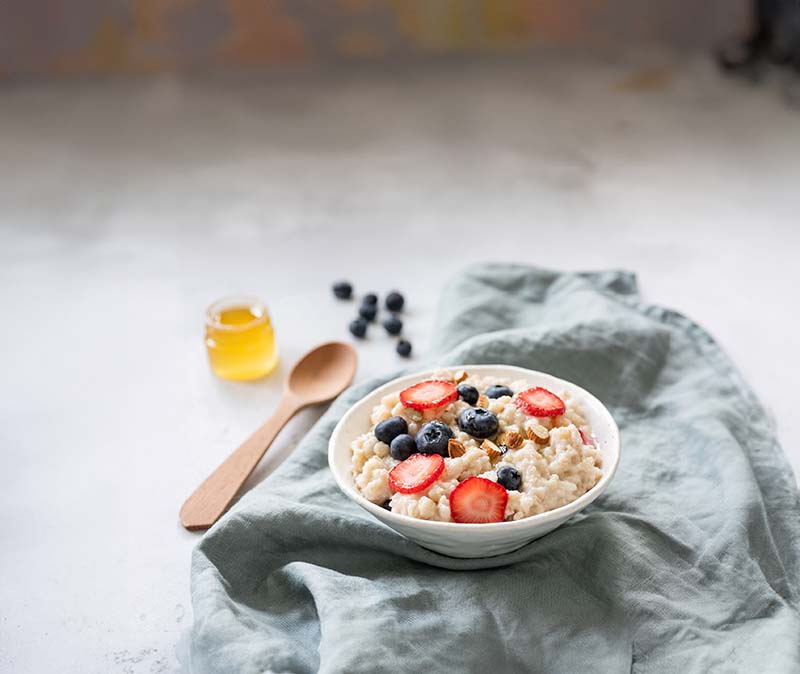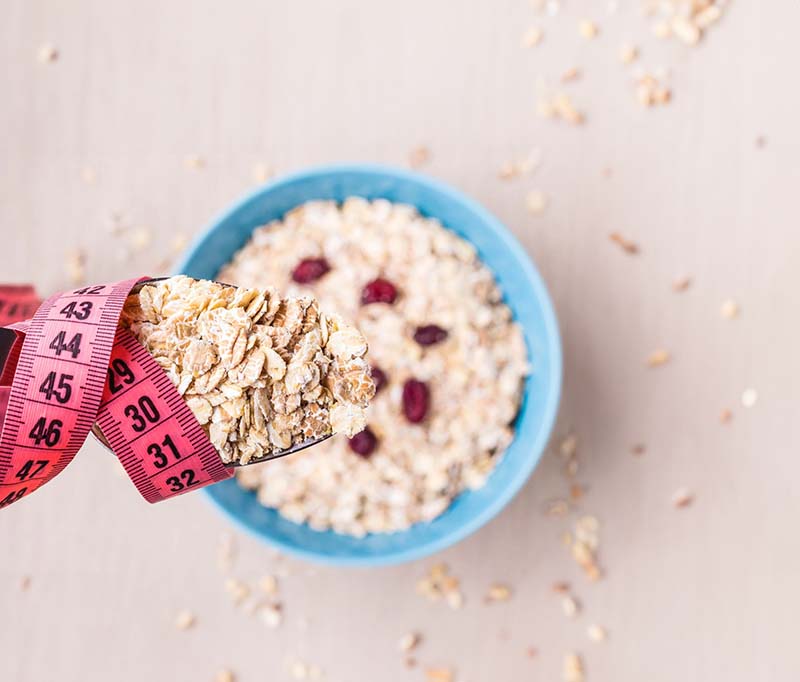Every day, we face the challenging decision of choosing our breakfast. This choice is particularly crucial when we ask, ‘Does Oatmeal Help with Weight Loss?’ Whether you’re in a hurry needing something portable, or have time to enjoy a lavish meal, it’s vital that your first meal sets a positive tone for the day.
Oatmeal, meeting these criteria excellently, provides not just a healthy energy boost and essential nutrients, but also aids in weight management. Is oatmeal healthy for weight loss? This straightforward, speedy option is loaded with health advantages, making it worth considering in our daily diet.
Related articles
- Are Lentils Good for Weight Loss: Health Benefits.
- Are Figs Healthy for Weight Loss? Uncovering the Facts!.
- Is Quinoa Good for Weight Loss?.

1. Does Oatmeal Help with Weight Loss?
Oatmeal has long been recognized in nutritional studies as a possible helper in weight loss journeys. Research from the Journal of the American College of Nutrition reveals that those who eat oatmeal for breakfast feel fuller for a longer period compared to those who eat other breakfast cereals. This extended satiety can lead to reduced calorie consumption throughout the day.
Furthermore, a 2016 study from the Journal of Nutrition found that the beta-glucan fiber in oatmeal is effective in enhancing feelings of fullness, aiding in weight control. “Incorporating oatmeal into your morning meals might be a strategy to support your weight loss goals,” suggests Schachter.
However, it’s important to remember that no single food serves as a magic solution for weight loss. Oatmeal can be a beneficial part of a diet aimed at weight reduction due to its fiber content, which can help you feel full and eat less. But ultimately, weight change is determined by the overall balance of calories consumed versus calories expended.
Tip: To maximize the weight loss benefits of oatmeal, consider pairing it with protein-rich toppings like nuts or yogurt. This can further increase satiety and provide a balanced nutrient profile. Keep in mind, moderation and overall diet quality are key for effective weight management.

2. Why Is Oatmeal Good for Weight Loss?
Oatmeal is a great choice for those looking to manage weight for a few reasons. It’s a complex carb filled with fiber, particularly a kind called beta-glucan. This fiber turns to a gel in your stomach, slowing down how quickly your stomach empties and how fast sugar enters your bloodstream. This helps control your appetite and keeps you feeling full longer, which may lead to eating less. Besides, oatmeal is packed with nutrients and can even help lower cholesterol levels. Losing weight typically happens when you burn more calories than you eat, so foods like oatmeal that help you eat less can aid in weight loss.
However, remember that how much oatmeal affects weight loss can depend on your overall diet and lifestyle. Also, it’s better to eat less processed oatmeal and watch out for added sugars.
Note: For an even healthier bowl, add fresh fruits or nuts to your oatmeal instead of sugar. This adds natural sweetness and extra nutrients without too many extra calories. And always keep an eye on portion sizes to ensure you’re not overeating even healthy foods like oatmeal.

3. Benefits of Consuming Oatmeal
Oatmeal offers a range of benefits, from promoting satiety and heart health to enhancing skin and immune function, while also supporting a healthy gut microbiome.
Promotes Prolonged Satiety
Oatmeal, a complex carbohydrate rich in soluble fiber known as beta-glucan, creates a gel-like substance in your digestive tract, slowing down how quickly your stomach empties and sugar is absorbed. This leads to better appetite control and a longer feeling
of fullness, reducing the likelihood of overeating. This aspect of oatmeal is especially beneficial for weight control and maintaining good health
Reduces The Risk of Heart Disease
The soluble fiber in oatmeal, beta-glucan, is known to lower total and LDL (bad) cholesterol levels, which are key factors in the development of heart disease. It works by binding cholesterol in the intestines, preventing its absorption into the bloodstream. Additionally, oats contain antioxidants, particularly avenanthramides, which can reduce inflammation and improve blood vessel function, contributing to heart health.

A Readily Available and Healthy Grain Option
Oatmeal is a convenient and accessible whole grain, packed with essential nutrients like manganese, phosphorus, magnesium, and iron. It’s also a good source of antioxidants, including avenanthramides, which provide anti-inflammatory and anti-itching benefits. Its wide availability and nutritional profile make oatmeal an excellent addition to a healthy diet.

Enhances Skin Health and Boosts Immunity
Colloidal oatmeal, or finely ground oats, is recognized by the FDA as skin protective. Oats contain bioactive compounds, including avenanthramides, which have anti-inflammatory and antioxidant properties beneficial for skin health. The beta-glucan in oats also helps enhance the immune response, supporting overall health and immunity.

Contributes to Balancing Your Gut Microbiome
The beta-glucan in oatmeal acts as a prebiotic, nourishing the beneficial bacteria in your gut. A healthy gut microbiome is crucial for effective digestion, nutrient absorption, and overall gut health. By promoting the growth of good bacteria, oatmeal supports a balanced and healthy gut, contributing to general well-being.
4. Potential Downsides to Regular Oatmeal Consumption
Experiencing Stomach Bloating
It’s not a widespread issue, but consuming oats can lead to stomach bloating in some individuals. This typically occurs when there’s a drastic shift in dietary habits, such as suddenly increasing fiber intake by consuming large amounts of oatmeal.
This change can cause abdominal discomfort, including cramps and excessive gas. To circumvent this issue, it’s advisable to start with a smaller quantity of oats and incrementally increase the intake.
This gradual approach allows the gut bacteria to adjust to the dietary change, ensuring a smoother transition. However, stomach bloating from oatmeal isn’t solely due to a high fiber diet.
It can also stem from a sensitivity to oat proteins (prolamins) or be a symptom of chronic dyspepsia (indigestion). A helpful tip to mitigate this issue is to opt for finely ground oats combined with digestive enzymes. Soaking oat flakes overnight also helps to neutralize their acidity and activate enzymes, facilitating easier digestion.
Gas Build-up from Oatmeal
Fiber aids digestion but isn’t fully digested itself. It travels through the digestive system, reaching the colon where gut bacteria (like Bacterioid and Bifidobacterium) break it down, releasing gases like carbon dioxide, hydrogen, and sometimes methane and sulphide.
This process can cause gas retention, leading to bloating and stomach discomfort due to the pressure exerted by these gases. Oats, rich in both soluble and insoluble fiber, can contribute to gas build-up if consumed in excess.
Foods with high soluble fiber content, such as oat flour, tend to produce more gas than those high in insoluble fiber, like wheat semolina or brown rice.
To avoid this, gradually introduce oats into your diet, increasing from 55g to 85g of dietary fiber over ten days. Pay attention to how your body reacts during this period.
Another strategy is to soak oats to break down hard-to-digest proteins and use digestive enzyme supplements from health stores. If gas production is unavoidable, consider using over-the-counter simethicone products to reduce flatulence by combining gas bubbles.

5. Nutritional Facts of Oatmeal
Oats are a powerhouse of nutrients, striking a perfect balance in their composition. They’re an excellent source of carbohydrates and fiber, particularly the beneficial beta-glucan fiber. What makes oats stand out is their impressive protein quality, providing a well-rounded profile of essential amino acids. This makes them an ideal choice for a balanced diet.
Rich in vital vitamins, minerals, and antioxidant plant compounds, oats are more than just a breakfast staple. Just half a cup (40.5 g) of dry oats packs a nutritional punch:
- Manganese: A whopping 63.91% of your daily needs
- Phosphorus: 13.3%
- Magnesium: Another 13.3%
- Copper: 17.6%
- Iron: 9.4%
- Zinc: 13.4%
- Folate: 3.24%
- Vitamin B1 (thiamin): 15.5%
- Vitamin B5 (pantothenic acid): 9.07%
- Plus smaller but still significant amounts of calcium, potassium, vitamin B6 (pyridoxine), and vitamin B3 (niacin)
A cup of prepared oatmeal (using half a cup of dry oats with water) also offers:
- 27.4 grams of carbs
- 5.3 grams of protein
- 2.6 grams of fat
- 4 grams of fiber
- All for just 153.5 calories
Conclusion
Does oatmeal help with weight loss? Indeed, it can play a significant role in your diet by providing lasting fullness, vital nutrients, and aiding overall health, especially when combined with a balanced diet and lifestyle. We encourage you to share your own oatmeal stories or any tips you might have for a healthier life.
Your experiences are invaluable to us and our community. Also, for more tips and information on health and wellness, be sure to explore other blogs from HealthConnect. Join the conversation and embark on a journey to better health today!
Source:
pubmed.ncbi.nlm.nih.gov
ncbi.nlm.nih.gov
fdc.nal.usda.gov

Dr. Joyce Slater: Your Guide to Informed Health Choices
Dr. Joyce Slater shines as a distinguished expert in the field of nutrition and public health. Contributing her vast expertise to HealthConnectbc, she embodies a deep-seated passion for enhancing public well-being. As a respected figure in her field. Dr. Slater’s academic journey and professional achievements are nothing short of inspirational.
Holding a significant position as a researcher and educator, Dr. Slater has delved deeply into the intricacies of food literacy and nutritional science. Her work, prominently featured in numerous esteemed scientific publications, underscores her dedication to expanding our understanding of food’s role in health and society.
At the heart of Dr. Slater’s professional ethos is a profound desire to positively impact individual lives through education and research. She often says, “Empowering people with the knowledge to make healthier choices is the most rewarding aspect of my work.” This principle is the cornerstone of her involvement with HealthConnectbc, where she strives to provide reliable and practical health advice.
Dr. Slater’s contributions to HealthConnectbc are multifaceted: academically, she offers insights into the complex world of nutrition and health, enhancing both public understanding and professional practices. Additionally, she is instrumental in guiding and inspiring the next generation of health professionals, thus fostering future excellence in the field.
Juggling rigorous research with her educational duties, Dr. Slater demonstrates an unwavering commitment to her profession. Her approachable nature and genuine concern transcend the confines of academia, touching the lives of everyone she interacts with. Dr. Slater looks forward to continuing her journey of discovery and education, dedicated to the ongoing improvement of public health and nutrition.
At HealthConnectbc, Dr. J. Slater is not just a contributor; she is a guiding light, dedicated to enlightening and motivating individuals towards a healthier and more informed lifestyle.
PUBLISHED ARTICLES
- Food literacy competencies: A conceptual framework for youth transitioning to adulthood (2018)
- Self-perceived eating habits and food skills of Canadians (2016)
- Challenges to acquiring and utilizing food literacy: Perceptions of young Canadian adults (2016)
- Socio-demographic and geographic analysis of overweight and obesity in Canadian adults (2009)
- Sustainable well-being: Concepts, issues, and educational practices (2014)

